Genre: Sports Developer: Accolade Publisher: Accolade Players: 1-4 Year: 1994
Have you ever heard of a basketball game that spun off its very own fan-inspired RPG? If so, then you’ve probably heard of a little exercise in RPG Maker (later ported to Game Maker) with the inspiring name Tales of Game’s Presents Chef Boyardee’s Barkley, Shut Up and Jam: Gaiden, Chapter 1 of the Hoopz Barkley SaGa,or Barkley, Shut up and Jam: Gaiden for short. Surprisingly, this isn’t even the most insane product starring the former NBA MVP (Godzilla vs. Barkley, anyone?). Anyway, said fan-created game was a somehow chaotic, but actually pretty fun experience that attracted a lot of followers of its own, showcased by a successful Kickstarter campaign that managed to raise about $120.000 for a planned sequel. Kind of awesome, though you have to consider two things. One, aside from a couple of sprites and screens that were ripped out of the original game (as well as at least a dozen others), this Barkley Shut Up and Jam: Gaiden has nothing to do with the original except for being based off a somewhat ridiculous name. And two, the original game is a simple 16-bit basketball game. Though it evidently gathered quite a few fans of its own considering the aforementioned events. Or did it?
Given all the insanity I mentioned above, the next sentence may come as a bit of a disappointment: Barkley Shut up and Jam (from here on out referred to as BSUJ) is pretty much a direct rip-off of the 16-bit era hit game NBA Jam. The basic elements are the same: Fast-paced two-on-two basketball with minimal rules and no fouls. There are a handful of elements in place that should distinguish Barkley from its obvious inspiration. There’s of course the titular main character. Accolade managed to get exclusive support from “Sir” Charles himself. So they put him right on the cover, over the menus, and implemented him as the best playable character in the game. This exclusive deal is also the reason why later revisions of NBA Jam as well as NBA Jam T.E. had to remove Barkley from their roster. On the other hand, Accolade only bothered to get one license for a character, which means the rest of the cast is made up from fictitious players. At least Accolade tried to give those some semblance of individuality and distinguishable looks.
Speaking of the character selection though, the roster is rather small. 16 characters (each with their individual stats) seems a bit sparse for a mid-’90s game; the big role model NBA Jam already sported 27 teams and 54 characters. I’ll try not to draw too many comparisons between Midway’s arcade and home console hit and this game, but already it becomes apparent that this game compares rather unfavorable to the title it wants to mimic. But let’s see if it can nevertheless stand on its own.
As I mentioned before, the roster is smaller than in other games. 16 characters is still an okay amount of different players though. Each character has his own strengths (with “Sir Charles” being definitely the best character). In tournament mode, the 16 characters are separated into eight different teams, though Phoenix, Barkley’s home town at the time, is not available: The two best characters are reserved for the last and strongest team to defeat. as you only get seven opponents in tournament mode, a playthrough doesn’t take too long. However, if you don’t want to beat the entire game in one sitting, you’re provided with a short password after each victory.
Other than most console basketball games, BSUJ does not place the game into big arenas (at least not for the most part). Rather, it wants to keep things real and takes the sport into the streets. Most courts have a strong backyard feel to them, giving them a dirty, gritty feel that actually suits a no frills/no rules basketball game rather nicely. There are two major exceptions though: The Miami court is set at the beachside and tries to emulate a sunny Florida summer feel. Also, when playing tournament mode, the final stage in Phoenix still takes you into your typical big basketball arena. I guess they couldn’t keep a star player like Barkley limited entirely to the streets. Anyway, while by 1994 there certainly were games with better, more detailed graphics, BSUJ’s in-game optics are rather nice. The scrolling is good (though it could be a tad faster), and like the looks of the courts in particular, even the relatively generic stadium stage. The characters could have profited from a few more animations though, but I’ve seen far worse in that department, so no complaints here either. The presentation of the menu screens is rather lacking though. Text options over a heavily pixelated profile picture of Sir Charles himself are rather dull, though still functional.
The sound is an entirely different matter though. BSUJ has some of the most awful voice samples I’ve heard in any game, ever. They’re practically incomprehensible! The very first of those mumbled patches of white noise assaults you the moment the Sega logo comes up, and I only THINK that this garbled gibberish is supposed to mean “Shut up and Jam.” If that wasn’t the title of the game, I still wouldn’t have the faintest idea what this unintelligible noise is supposed to say (“Down with the man?” “Dance like a pig?” “Chamomile Rain?”). The rest of the sounds isn’t much better either. The music, on the other hand, is sort of a mixed bag. Keeping in line with the backstreet theme, the tunes are hip-hop inspired and, for the most part, fits the game just fine, if a bit thin and tinny. What bothers me though is that the music accompanying the individual matches as too repetitive. There are also only two or three different tracks for the games, so if you’re planning to do several matches in a row, be prepared to hear the same tunes over, and over, and over again.
Still, it all comes down to the gameplay. And there’s no denying it, BSUJ took some major… uhm… let’s say “inspiration” from NBA Jam. It doesn’t blatantly steal from the other game though. What Accolade did was to basically copy the template and tweak it. For example, like NBA Jam, BSUJ also has some sort of “turbo” meter that you can activate in order to run faster, steal (or better: foul) more effectively and get better at performing shots and dunks. Unlike NBA Jam however, this doesn’t come in form of a bar that recharges over time, but rather in a fixed amount of charges. Each player can use his turbo up to six times. However, whenever you perform a successful steal or score a three-point shot, you get one of those charges back. I must admit that I like this mechanic, as it urges you to take a risk and try more shots from the distance than simply charging up and aiming for that spectacular super dunk.
There are also some minor differences in the controls here and there. For example, if your player already started to jump up for a shot, you are no longer able to pass the ball. Also, you only control one player. Your partner is completely dependent on the AI, meaning that you can’t order him to make a shot or pass the ball. That’s a bit of a letdown. Other than that, the controls feel rather tight and responsive.
The rule set for the game is even more minimalist than others. As I mentioned before there are no fouls and no referees, just a straight up rush for who scores first, which makes up for a nice pace. There is also no shot clock, so if you manage to get the ball under control, you can pretty much freely run with it and pass it around without being forced to make a shot. If you’re good at holding the ball you can effectively prevent the opponent from scoring that way. It’s not fair, but then again, backyard basketball rarely is. There’s one rule still remaining though – the goal-tending violation. So, If you try to block a shot that’s already closing in on the basket from directly underneath, chances are that it still counts. I don’t really understand what this rule is doing in a street sports type of game. Furthermore, it is poorly implemented, as the game may still call a goal-tending violation even if the ball has already audibly touched the rim!
Speaking of poor implementation, even though the game controls well for the most part, there are a few kinks that should have been worked out before the game shipped. On a few occasions when you pass, the ball twitches randomly and seems to fly off in the wrong direction before it suddenly zooms into the hands of another player at ludicrous speed. I’ve heard people defend this by saying that it’s supposed to be that way, though I believe it’s a glitch. It’s also very confusing, as you can’t really see where the ball is going for a moment, and it’s also possible that it may outrun the screen that way. Another thing is often considered to be an error when I feel it’s a nice touch actually. If you try to make a shot when you stand behind your own basket, chances are that your own backboard is blocking your way. If that happens to you when you make your last-ditch attempt at a three-pointer, this can be a frustrating discovery, but I actually liked that implementation.
Finally, there is one cheap annoyance that really got on my nerve whenever I played this game: when time runs out, the computer has an unfairly high chance of sinking his final “Hail Mary” shot. At least four out of five times, the last throw the opponent AI makes before timeout scores a successful three-pointer. So don’t let the game run close, because if the computer gets the ball at the last second of the match, your two-point advantage pretty much amounts to nothing.
I think what we have here can fairly be described as NBA Jam on a budget. Accolade’s outings on the Genesis generally weren’t of top-notch quality, but this is one of its better ones. A few of the mechanics, like the way of recharging your special ability meter, are actually quite nice, the controls work pretty well, and the game successfully transmits a certain feel of gritty street basketball. It doesn’t do enough to really shine though. The sound effects are bad, the music is bland and repetitive, the graphics could have done with some polish in places, and then there are the occasional glitches. Could be better, could be worse. Given what else is out there in the sports genre in general and in basketball games for the Genesis in general, I think this one rates as slightly above average, barely, but still so.
Score: 6 out of 10

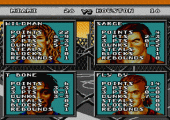
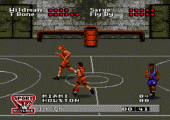
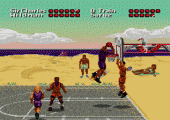
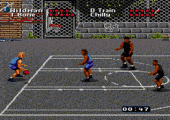
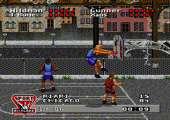
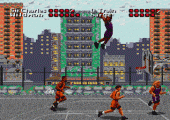
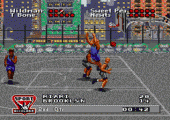
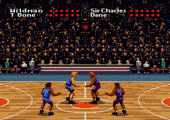
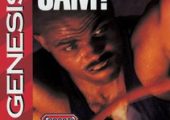
Recent Comments